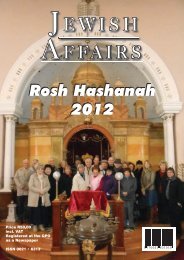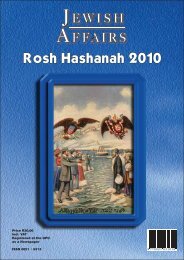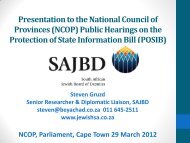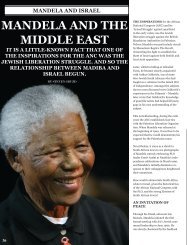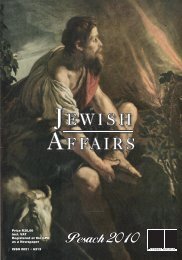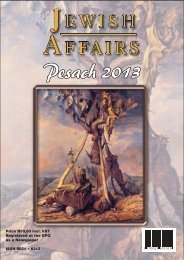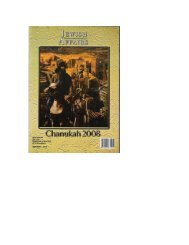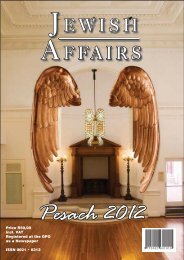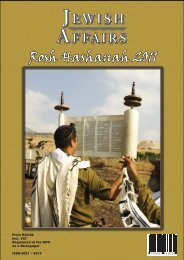Rosh Hashanah 2009 - South African Jewish Board of Deputies
Rosh Hashanah 2009 - South African Jewish Board of Deputies
Rosh Hashanah 2009 - South African Jewish Board of Deputies
- No tags were found...
Create successful ePaper yourself
Turn your PDF publications into a flip-book with our unique Google optimized e-Paper software.
JEWISH AFFAIRS ROSH HASHANAH <strong>2009</strong>divided into five chapters (incidentally, each chapter<strong>of</strong> the book commences with an appropriate quotationfrom such well-known figures as Winston Churchill,Saul Bellow, Albert Camus, Karl M, TheodoreRoosevelt and Chief Justice Ismail Mahomed). Inthe first, Leon describes his origins and background.Himself a third generation <strong>South</strong> <strong>African</strong>, his rootsare firmly Litvak. Most <strong>of</strong> his forebears can tracetheir origins to the Pale <strong>of</strong> Settlement, created in1791 by Catherine the Great. His maternalgrandfather, Samuel Herman (Sam), was one <strong>of</strong> ninechildren born in Kovno, Lithuania. He arrived inCape Town in 1912. Shortly after the First WorldWar, the Hermans moved to Johannesburg. Sam andhis brother-in-law, Louis Traub, established asuccessful firm <strong>of</strong> wholesale wool merchants, Herman& Traub. The family first lived in Saratoga Avenuein Doornfontein, a suburb which at the time attractedmany <strong>Jewish</strong> immigrants. In 1923, Sam marriedRachel Kowarsky, whose family had immigrated to<strong>South</strong> Africa from Vilnius, Lithuania. In 1929 Leon’smother, Sheila Jean, was born. She married Leon’sfather, Ramon (Ray), in March 1954. Ray, then anadvocate, was later to become a judge in Natal. Hisforebears were not dissimilar in origin to those onLeon’s maternal side. Leon’s parents divorced in1965. His mother was married three times and hisfather twice. Leon married Michal, a divorcee, in2000.Leon attended King David High School,Linksfield, for a short time. Previous to this, he hadbeen exposed in Natal to a completely seculareducation. He had learned his barmitzvah portion byheart using a tape recorder and, on High Holidaysattended, largely unwillingly, the Durban synagogue.He says that he identified later in life with a famousBritish politician Lord Keith Joseph who, on beingasked about what sort <strong>of</strong> Jew he was, responded,“…minimally practising but maximallyacknowledging”. Leon certainly respondedmaximally as a Jew, vigorously defending <strong>Jewish</strong>causes and fighting strongly against antisemitismwherever he encountered it. He was a frequent speakerat functions organised by the SA <strong>Jewish</strong> <strong>Board</strong> <strong>of</strong><strong>Deputies</strong>, amongst many other <strong>Jewish</strong> organisationsIn Chapter Two, entitled “Dancing withDialectics”, Leon describes his close on twenty-yearinvolvement with the University <strong>of</strong> the Witwatersrandand the rebuff <strong>of</strong> his attempts to become president <strong>of</strong>the Student’s Representative Council. He deals withhis brief entry into the practicing legal pr<strong>of</strong>ession asan articled clerk, his interaction with leading members<strong>of</strong> the Bar and his time in the <strong>South</strong> <strong>African</strong> army andnavy.Chapter Three begins with the author’s entry intopolitics. This commenced with his victory in aFebruary 1986 by-election for the JohannesburgCity Council. He stood against another Jew, SamBloomberg (National Party), and succeeded by amere 39 votes in a poll <strong>of</strong> 31%. His career inmunicipal politics culminated with his victory, againover another Jew, M Rosen, in October 1989, by anoverall majority <strong>of</strong> 1599 and his subsequent electionas leader <strong>of</strong> the Progressive Federal Party in theCouncil. The chapter also deals with Leon’s clasheswith the veteran, and greatly admired, <strong>Jewish</strong>politician, Harry Schwarz.Chapter Five chronicles some <strong>of</strong> the author’sactivities, flowing from what he describes as the “theBattle <strong>of</strong> Houghton” and ends with his unopposedelection, with acclamation, as the single leader <strong>of</strong> theDemocratic Party. He won the nomination to representthe Houghton constituency despite opposition fromthe late Helen Suzman. The latter had occupied theseat for many years and favoured Irene Menel for thenomination. Suzman complained that “Mr Leon’slobbying effort to achieve nomination madeTammany Hall look like a teddy bears’ picnic”. Sherepeated the remark in the 1994 update <strong>of</strong> hermemoirs. Leon never responded in public, butregarded her comment as “grossly unfair, inflatedand unjustified”. Although 1989 propelled him intonational and parliamentary politics, Leon continuedto immerse himself in his civic leadership role.Part Two <strong>of</strong> the book deals succinctly, in twochapters respectively headed “New <strong>South</strong> Africa,New Leader” and “Constitutional Palimpsest”. InPart Three, the reader is treated to the author’sincisive and detailed discussion <strong>of</strong> the followingtopics: Zimbabwe, corrosion in the corridors <strong>of</strong>parliament, the judges, the media and “the Lady”(Winnie Madikizela-Mandela). Part Four describesLeon’s role as Leader <strong>of</strong> the Opposition and hiseventual handover to Helen Zille.In the final part <strong>of</strong> the book, Leon presents hisviews on the future. His comments on Jacob Zuma(bearing in that the book was written before thecharges against Zuma were withdrawn in April <strong>2009</strong>)are <strong>of</strong> particular interest. He writes: “In the event <strong>of</strong>Zuma being prosecuted successfully, even his deathdefyingpolitical skills may well not be sufficient toensure his presidential candidacy in <strong>2009</strong>. ShouldZuma prevail, most <strong>South</strong> <strong>African</strong>s have no clearidea where he will lead the country. For some, thewords ‘President Zuma’ are an unnerving prospect”.It would be most interesting to hear Leon’s viewsupon the withdrawal <strong>of</strong> the charges.The author concludes the book with the followingprophetic words:Whatever shape <strong>South</strong> Africa’s new leadershiptakes, immense challenges have to be met. Dowe want to be nostalgically remembered as afading footnote in world history, commemoratedfor one big thing we got right in 1994 - but witha sense <strong>of</strong> aching possibility about opportunitieslost, dreams deferred and goals missed sincethen? Or will we become, perhaps, againstexpectation, a success story <strong>of</strong> renewal, takingour place in the front row <strong>of</strong> winning nations,applying thoughtful policies and best practiceswith equal measures <strong>of</strong> good governance andself- restraint, transcending the divisions andiniquities <strong>of</strong> our history? …The future isimperfect, but it is ours to make.56



